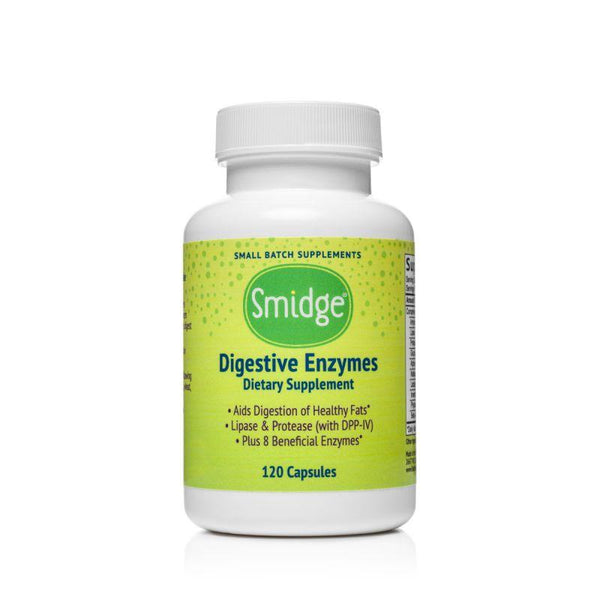Apa itu Enzim Pencernaan dan Mengapa Penting bagi Kesehatan Anda?

Enzim pencernaan merupakan bagian penting dari kesehatan pencernaan Anda. Dalam blog ini, kita akan membahas pentingnya enzim pencernaan, berbagai jenisnya, serta potensi manfaatnya dalam memasukkan enzim pencernaan ke dalam rutinitas harian Anda. Baik Anda seorang penggila kesehatan atau seseorang yang ingin meningkatkan kesehatan pencernaan, blog ini akan mengupas kekuatan enzim pencernaan dan bagaimana enzim tersebut mendukung kesehatan Anda.
Memahami Enzim Pencernaan
Definisi enzim pencernaan
Enzim pencernaan adalah protein khusus yang membantu memecah makanan menjadi komponen nutrisi yang dapat diserap tubuh. Enzim ini diproduksi oleh tubuh di berbagai organ, termasuk kelenjar ludah, lambung, pankreas, dan usus halus. Enzim ini mempercepat proses pencernaan dan memungkinkan tubuh mengakses nutrisi penting yang ditemukan dalam makanan.
Tanpa enzim pencernaan, tubuh akan kesulitan memecah makanan secara efektif, yang menyebabkan ketidaknyamanan pencernaan dan potensi kekurangan nutrisi.
Jenis-jenis enzim pencernaan dan fungsinya
Ada beberapa jenis enzim pencernaan, masing-masing memiliki fungsi khusus dalam memecah berbagai komponen makanan. Beberapa enzim pencernaan utama meliputi:
- Amilase: Memecah karbohidrat menjadi gula sederhana.
- Protease: Mendukung pencernaan protein menjadi asam amino.
- Lipase: Memfasilitasi pemecahan lemak menjadi asam lemak dan gliserol.
Enzim pencernaan lainnya, yang dibuat di usus halus, termasuk laktase dan sukrase yang memecah laktosa dan sukrosa.
Peran Enzim Pencernaan dalam Tubuh Anda
Cara kerja enzim pencernaan
Enzim pencernaan bekerja di saluran pencernaan, dimulai sejak makanan masuk ke mulut. Kelenjar ludah mengeluarkan enzim pencernaan, amilase, untuk memecah karbohidrat. Saat makanan bergerak lebih jauh ke bawah tubuh dan masuk ke lambung, cairan lambung yang mengandung protease dan lipase bergabung dalam proses untuk memecah protein dan lemak lebih lanjut. Di usus halus, amilase, protease, dan lipase melanjutkan proses pencernaan untuk memastikan bahwa nutrisi diserap secara efektif ke dalam aliran darah.
Pentingnya enzim pencernaan untuk kesehatan secara keseluruhan
Enzim pencernaan juga memainkan peran yang sangat penting dalam mendukung kesehatan kita secara keseluruhan dengan memfasilitasi pemecahan dan penyerapan nutrisi dari makanan yang kita makan.
Enzim-enzim ini membantu mencerna karbohidrat, protein, dan lemak, yang secara kolektif dikenal sebagai 'makronutrien', untuk memberi tubuh nutrisi penting yang dibutuhkan untuk energi, perbaikan sel, dan pertumbuhan.
Enzim pencernaan sangat penting untuk menjaga mikrobioma usus yang sehat dan seimbang serta mengurangi masalah pencernaan seperti kembung, gas, dan gangguan pencernaan. Usus yang sehat juga mendukung fungsi kekebalan tubuh dan membantu mengurangi peradangan dalam tubuh.
Masalah Pencernaan Umum dan Peran Enzim Pencernaan

Bila tubuh tidak memproduksi enzim pencernaan yang cukup, pencernaan dan penyerapan nutrisi dapat terganggu. Hal ini dapat menyebabkan berbagai masalah pencernaan, termasuk kembung, gas, dan kekurangan nutrisi.
Enzim Pencernaan dan Gangguan Pencernaan
Gangguan pencernaan dapat dikaitkan dengan kekurangan enzim pencernaan. Ini adalah kondisi yang relatif umum yang ditandai dengan rasa tidak nyaman atau nyeri di perut bagian atas. Gejalanya dapat meliputi kembung, gas, mual, nyeri perut, dan sembelit. Mengonsumsi suplemen enzim pencernaan dapat membantu meringankan gejala-gejala ini dengan membantu memecah makanan.
Enzim Pencernaan dan Sindrom Iritasi Usus Besar (IBS)
Sindrom Iritasi Usus Besar (IBS) adalah gangguan gastrointestinal umum yang memengaruhi usus besar. Pada orang yang menderita IBS, enzim pencernaan dapat berperan dalam mendukung kenyamanan pencernaan. Meskipun diperlukan lebih banyak penelitian di bidang ini, beberapa orang dengan IBS telah melaporkan adanya perbaikan gejala saat menggunakan suplemen enzim pencernaan.
Enzim Pencernaan dan Intoleransi Makanan
Intoleransi makanan, seperti intoleransi laktosa, dapat disebabkan oleh kekurangan enzim pencernaan tertentu. Misalnya, orang dengan intoleransi laktosa tidak memiliki enzim laktase, yang diperlukan untuk memecah laktosa, gula yang ditemukan dalam susu dan produk olahan susu.
Memasukkan Enzim Pencernaan ke dalam Rutinitas Harian Anda
Sumber makanan alami enzim pencernaan
Ada beberapa makanan yang mengandung enzim pencernaan alami dan menambahkan makanan kaya enzim ini ke dalam pola makan Anda dapat mendukung produksi enzim pencernaan tubuh secara alami. Beberapa makanan kaya enzim yang dapat Anda tambahkan ke dalam pola makan Anda meliputi:
- Nanas: Mengandung bromelain yang mendukung pencernaan protein.
- Pepaya: Kaya akan papain yang digunakan untuk melunakkan daging.
- Mangga: Mengandung amilase yang memecah karbohidrat menjadi gula.
- Jahe: Mengandung zingibain yang membantu mencerna protein.
- Kefir: Minuman susu fermentasi yang mengandung enzim laktase yang memecah laktosa.
- Madu (terutama madu mentah) : Mendukung pencernaan pati dan gula.
- Sauerkraut: Kubis yang difermentasi kaya akan probiotik dan enzim hidup yang membantu pencernaan.
- Kimchi: Terbuat dari sayuran yang difermentasi dan mengandung enzim dan probiotik.
Dapatkan suplemen enzim pencernaan Anda dari Nourishme Organics
Di Nourishme Organics , rangkaian suplemen kesehatan usus terkemuka di Australia, kami menyediakan berbagai produk yang mendukung kesehatan pencernaan Anda.
Salah satu produk enzim pencernaan utama kami adalah suplemen Smidge Digestive Enzymes . Smidge Digestive Enzymes adalah suplemen yang bersih namun ampuh yang mengandung campuran enzim yang kompleks untuk mendukung pemecahan karbohidrat, protein, lemak, sayuran, dan gula serta menyerap nutrisinya.
Jika Anda menderita masalah pencernaan seperti gangguan pencernaan, kembung, kepekaan terhadap makanan, atau telah menjalani operasi pengangkatan kantung empedu, Thorne Advanced Digestive Enzymes akan membantu meningkatkan pencernaan. Suplemen ini memadukan asam klorida, pepsin, enzim pankreas, dan empedu sapi untuk meningkatkan penyerapan berbagai nutrisi penting. Kami juga merekomendasikan kapsul Plantizyme dari Thorne yang merupakan enzim berbasis tanaman untuk memberikan dukungan pencernaan.
Di Nourishme Organics, kami juga memiliki berbagai macam produk untuk membantu Anda meningkatkan kesehatan pencernaan. Produk-produk tersebut meliputi produk kefir dan starter kit , kit fermentasi , cuka sari apel dengan jahe , suplemen kesehatan usus , serta prebiotik dan probiotik .
Jika Anda baru mengenal dunia suplemen pencernaan , penting untuk memulai dengan dosis kecil dan menambahnya secara bertahap jika diperlukan. Ini akan memungkinkan Anda menikmati manfaat enzim pencernaan dan produk lain yang membantu pencernaan sambil meminimalkan potensi kekurangannya.
Tips untuk memaksimalkan manfaat enzim pencernaan

Selain menggabungkan sumber makanan alami dan suplemen , cara lain untuk meningkatkan aktivitas enzim pencernaan meliputi mengunyah makanan secara menyeluruh, mengelola stres, dan menjaga pola makan seimbang yang kaya buah-buahan, sayur-sayuran, dan makanan utuh.
Kesimpulan
Enzim pencernaan berperan penting dalam menjaga kesehatan pencernaan yang optimal. Dari memecah makanan hingga mendukung penyerapan nutrisi, enzim yang kuat ini penting untuk kesehatan secara keseluruhan. Memahami dampak enzim pencernaan pada masalah pencernaan umum dapat membantu individu membuat pilihan yang tepat untuk mendukung kesehatan pencernaan mereka. Baik melalui sumber makanan alami, suplemen, atau perubahan gaya hidup, membuka kekuatan transformatif enzim pencernaan dapat bermanfaat bagi siapa pun yang ingin meningkatkan kesehatan pencernaan mereka.















